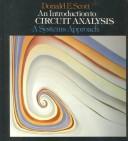| Listing 1 - 8 of 8 |
Sort by
|

ISBN: 0070561273 9780070561274 Year: 1987 Publisher: New York: McGraw-Hill,
Abstract | Keywords | Export | Availability | Bookmark
 Loading...
Loading...Choose an application
- Reference Manager
- EndNote
- RefWorks (Direct export to RefWorks)

ISBN: 0977285111 Year: 2006 Publisher: portland, Or. Mikamar
Abstract | Keywords | Export | Availability | Bookmark
 Loading...
Loading...Choose an application
- Reference Manager
- EndNote
- RefWorks (Direct export to RefWorks)
Book
ISBN: 1786355019 1787143082 1786355027 9781786355010 9781786355027 9781787143081 9781786355027 Year: 2017 Publisher: Bingley, UK
Abstract | Keywords | Export | Availability | Bookmark
 Loading...
Loading...Choose an application
- Reference Manager
- EndNote
- RefWorks (Direct export to RefWorks)
Research indicates change is complex and difficult, and requires considerable time to achieve, sometimes years or even decades. This book presents major findings from a research study exploring the leadership needed to enact rapid change - defined as three years or less - in various school contexts, overtly including the perspectives of leaders, teachers, students, parents, community members, and district leaders. We challenge many of the assumptions in current scholarly literature about how fast, complex change can or should be wrought within educational environments; indeed, our premise is that rapid, complex change is not only possible but may be highly desirable and successful given the right leadership approach.We present a pragmatic "rapid change" model emerging from in-depth explorations of successful leadership approaches that accelerated the change agenda in these schools. We outline the theoretical underpinnings to the model and overtly articulate the pragmatic approaches leaders found to be effective in implementing fast-paced change. We also present case studies of successful change in schools with descriptions and advice elicited from leaders and stakeholders.
Educational change. --- Leadership. --- Educational acceleration. --- Accelerated learning --- Acceleration in education --- Accelerative learning --- Intensive programs in education --- Ability --- Ability grouping in education --- Gifted children --- School management and organization --- Command of troops --- Followership --- Change, Educational --- Education change --- Education reform --- Educational reform --- Reform, Education --- School reform --- Educational planning --- Educational innovations --- Education --- Education. --- Educational leadership. --- Administration --- General. --- College leadership --- Education leadership --- School leadership --- Leadership
Book
ISBN: 3319233467 3319233475 Year: 2016 Publisher: Cham : Springer International Publishing : Imprint: Springer,
Abstract | Keywords | Export | Availability | Bookmark
 Loading...
Loading...Choose an application
- Reference Manager
- EndNote
- RefWorks (Direct export to RefWorks)
This book provides pragmatic strategies and models for student assessment and ameliorates the heightened sense of confusion that too many educators and leaders experience around the complexities associated with assessment. In particular, it offers guidance to school and district personnel charged with fair and appropriate assessment of students who represent a wide variety of abilities and cultures. Chapters focus on issues that directly impact the educational lives of teachers, students, parents, and caregivers. Importantly, the confluence of assessment practices and community expectations also are highlighted. Assessment is highly politicised in contemporary society and this book will both confirm and challenge readers’ beliefs and practices. Indeed, discerning readers will understand that the chapters offer them a bridge from many established assessment paradigms to pragmatic, ethical solutions that align with current expectations for schools and districts. In Part One, readers engage with concepts and skills needed by school learning leaders to guide optimal assessment practices. Part Two delves into student assessment within and across disciplines. Part Three provides pragmatic approaches that address assessment in the context of inclusive intercultural education, pluralism, and globalisation.
Education. --- School management and organization. --- School administration. --- Assessment. --- Assessment, Testing and Evaluation. --- Administration, Organization and Leadership. --- Learning & Instruction. --- Leadership. --- Leadership --- Study and teaching. --- Ability --- Command of troops --- Followership --- Educational tests and measuremen. --- Learning. --- Instruction. --- Learning process --- Comprehension --- Education --- Administration, Educational --- Educational administration --- Inspection of schools --- Operation policies, School --- Policies, School operation --- School administration --- School inspection --- School operation policies --- School organization --- Schools --- Management --- Organization --- Inspection --- Management and organization
Book
ISBN: 3319233971 331923398X Year: 2016 Publisher: Cham : Springer International Publishing : Imprint: Springer,
Abstract | Keywords | Export | Availability | Bookmark
 Loading...
Loading...Choose an application
- Reference Manager
- EndNote
- RefWorks (Direct export to RefWorks)
This book provides key insights into how educational leaders can successfully navigate the turbulence of political debate surrounding leading student assessment and professionalised practice. Given the highly politicised nature of assessment, it addresses leaders and aspiring leaders who are open to being challenged, willing to explore controversy, and capable of engaging in informed critical discourse. The book presents the macro concepts that these audiences must have to guide optimal assessment policy and practice. Collectively, the chapters highlight important assessment purposes and models, including intended and unintended effects of assessment in a globalised context. The book provides opportunities to explore cultural similarities and particularities. It invites readers to challenge taken-for-granted assumptions about ourselves and colleagues in other settings. The chapters highlight the cultural clashes that may occur when cross-cultural borrowing of assessment strategies, policies, and tools takes place. However, authors also encourage sophisticated critical analyses of potential lessons that may be drawn from other contexts and systems. Readers will encounter challenges from authors to deconstruct their assessment values, beliefs, and preconceptions. Indeed, one purpose of the book is to destabilise certainties about assessment that prevail and to embrace the assessment possibilities that can emerge from cognitive dissonance.
Education. --- School management and organization. --- School administration. --- Educational policy. --- ducation and state. --- Assessment. --- Assessment, Testing and Evaluation. --- Administration, Organization and Leadership. --- Educational Policy and Politics. --- Educational tests and measurements. --- Educational tests and measurements --- Education --- Social aspects. --- Evaluation. --- Educational assessment --- Educational measurements --- Mental tests --- Tests and measurements in education --- Psychological tests for children --- Psychometrics --- Students --- Examinations --- Psychological tests --- Rating of --- Educational tests and measuremen. --- Education and state. --- Education policy --- Educational policy --- State and education --- Social policy --- Endowment of research --- Administration, Educational --- Educational administration --- Inspection of schools --- Operation policies, School --- Policies, School operation --- School administration --- School inspection --- School operation policies --- School organization --- Schools --- Management --- Organization --- Government policy --- Inspection --- Management and organization
Book
ISBN: 2930011009 Year: 1991 Publisher: Jalhay Foxmaster
Abstract | Keywords | Export | Availability | Bookmark
 Loading...
Loading...Choose an application
- Reference Manager
- EndNote
- RefWorks (Direct export to RefWorks)
Bataille des Ardennes (1944-1945) --- Geschiedenis van de nieuwste tijden --- Oorlogen
Multi
ISBN: 9783319233475 3319233475 Year: 2016 Publisher: Cham : Springer International Publishing : Imprint: Springer,
Abstract | Keywords | Export | Availability | Bookmark
 Loading...
Loading...Choose an application
- Reference Manager
- EndNote
- RefWorks (Direct export to RefWorks)
This book provides pragmatic strategies and models for student assessment and ameliorates the heightened sense of confusion that too many educators and leaders experience around the complexities associated with assessment. In particular, it offers guidance to school and district personnel charged with fair and appropriate assessment of students who represent a wide variety of abilities and cultures. Chapters focus on issues that directly impact the educational lives of teachers, students, parents, and caregivers. Importantly, the confluence of assessment practices and community expectations also are highlighted. Assessment is highly politicised in contemporary society and this book will both confirm and challenge readers’ beliefs and practices. Indeed, discerning readers will understand that the chapters offer them a bridge from many established assessment paradigms to pragmatic, ethical solutions that align with current expectations for schools and districts. In Part One, readers engage with concepts and skills needed by school learning leaders to guide optimal assessment practices. Part Two delves into student assessment within and across disciplines. Part Three provides pragmatic approaches that address assessment in the context of inclusive intercultural education, pluralism, and globalisation.
Didactic evaluation --- School management --- Didactics --- Teaching --- Educational sciences --- Organization theory --- organisatiemanagement --- assessments (onderwijs) --- didactiek --- evaluatie (onderwijs) --- onderwijs --- leidinggeven --- opvoeding --- administratie --- Educational tests and measurements. --- School management and organization. --- Learning, Psychology of. --- Assessment and Testing. --- Organization and Leadership. --- Instructional Psychology.
Multi
ISBN: 9783319233987 331923398X Year: 2016 Publisher: Cham : Springer International Publishing : Imprint: Springer,
Abstract | Keywords | Export | Availability | Bookmark
 Loading...
Loading...Choose an application
- Reference Manager
- EndNote
- RefWorks (Direct export to RefWorks)
This book provides key insights into how educational leaders can successfully navigate the turbulence of political debate surrounding leading student assessment and professionalised practice. Given the highly politicised nature of assessment, it addresses leaders and aspiring leaders who are open to being challenged, willing to explore controversy, and capable of engaging in informed critical discourse. The book presents the macro concepts that these audiences must have to guide optimal assessment policy and practice. Collectively, the chapters highlight important assessment purposes and models, including intended and unintended effects of assessment in a globalised context. The book provides opportunities to explore cultural similarities and particularities. It invites readers to challenge taken-for-granted assumptions about ourselves and colleagues in other settings. The chapters highlight the cultural clashes that may occur when cross-cultural borrowing of assessment strategies, policies, and tools takes place. However, authors also encourage sophisticated critical analyses of potential lessons that may be drawn from other contexts and systems. Readers will encounter challenges from authors to deconstruct their assessment values, beliefs, and preconceptions. Indeed, one purpose of the book is to destabilise certainties about assessment that prevail and to embrace the assessment possibilities that can emerge from cognitive dissonance.
Didactic evaluation --- School management --- Teaching --- Educational sciences --- Organization theory --- onderwijspolitiek --- organisatiemanagement --- assessments (onderwijs) --- evaluatie (onderwijs) --- onderwijs --- leidinggeven --- opvoeding --- administratie --- Educational tests and measurements. --- School management and organization. --- Education and state. --- Assessment and Testing. --- Organization and Leadership. --- Educational Policy and Politics.
| Listing 1 - 8 of 8 |
Sort by
|

 Search
Search Feedback
Feedback About UniCat
About UniCat  Help
Help News
News